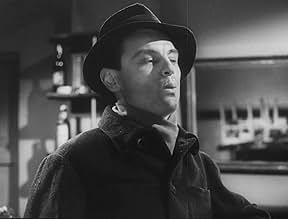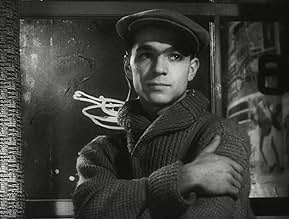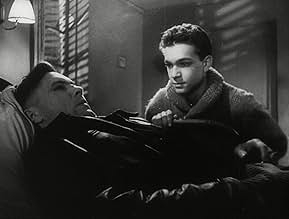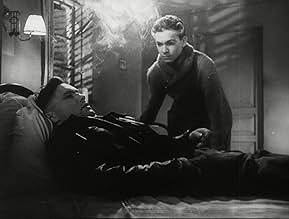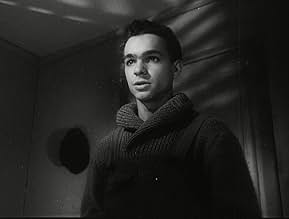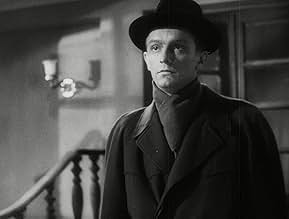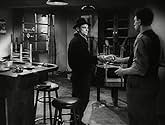Two men besiege a lunch bar looking for a third man they must kill.Two men besiege a lunch bar looking for a third man they must kill.Two men besiege a lunch bar looking for a third man they must kill.
- Directors
- Writers
- Stars
- Directors
- Writers
- All cast & crew
- Production, box office & more at IMDbPro
Featured reviews
This short film was a student project for a Soviet state film school, and I don't know how much exposure it would have had at the time it was made. It survives for viewing because one of the three students directors was a young Andrei Tarkovsky, and though his resources were constrained, the strength of the work is made evident through how much is done with a very basic production.
The door out of the restaurant seems to lead to a blank wall, but we nonetheless get the lonely atmosphere of a small-town American diner; the filmmakers really seem to have drank in the feel of the Hemingway they read for this adaptation. It's really a twenty-minute atmosphere piece, and it does that very well - the two murderers create a complete and stark sense of threat and menace.
In a constrained setting they made a claustrophobic and memorable film, with a real film-noir feel where we weren't necessarily expecting to find it. High marks!
The door out of the restaurant seems to lead to a blank wall, but we nonetheless get the lonely atmosphere of a small-town American diner; the filmmakers really seem to have drank in the feel of the Hemingway they read for this adaptation. It's really a twenty-minute atmosphere piece, and it does that very well - the two murderers create a complete and stark sense of threat and menace.
In a constrained setting they made a claustrophobic and memorable film, with a real film-noir feel where we weren't necessarily expecting to find it. High marks!
I rather like Hemingway's short story which the film is an exact transcription of, but I didn't feel the same things here. In fact, I didn't feel anything. There is, in the way Hemingway's text begins, a playful opacity about who is who, which obviously cannot be found in the film form. Moreover, a large part of the value of the text lies in the laid back, direct, and popular side of the dialogues, difficult to appreciate here if you don't speak Russian, of course. Nothing impressed or bothered me in the filming itself, it's neutral. The acting is very average, but it's hard to expect anything else from a student film.
My Rating : 7/10
Excellent little short film in the film-noir realm from the Russian master of cinema. The minimalist nature of it is rather absurd but I think within it the viewer must find meaning and that is genius.
Solid short film-noir.
Excellent little short film in the film-noir realm from the Russian master of cinema. The minimalist nature of it is rather absurd but I think within it the viewer must find meaning and that is genius.
Solid short film-noir.
Although I did like the 1946 adaptation of the Killers, I wasn't sure how a Russian, let alone someone who is usually much more into the visual prowess of things like Andrei Tarkovsky, would tackle Ernest Hemingway's brief, pulpy story of men on a mission and a man in hiding from those men. Turns out it's one of the best short films I've seen from a soon-to-be world renown European auteur, because of it's emphasis on the simplicity of suspense, of human action in desperate circumstances and how it's filmed with a mix of the noir style and with Tarkovsky's dependence on figures in curiously exciting compositions. He isn't alone on the film, however, as the middle scene at the apartment was directed by friend Alexander Gordon, with Tarkovsky directing the bigger chunks at the diner, and another guy Marika Beiku co-directing overall. Since the apartment scene is so short though, and accounts for just three shots, one being most elaborate as it goes in and out, tight and wide, on the morose Swede in hiding and his friend at the diner filling him in on what happened, it's mostly Tarkovsky's game here.
Part of the skill, and curiosity, in how tense the long first scene at the diner is that music is completely absent, with the only tone coming from Tarkovsky himself as a whistling customer. Meanwhile, Tarkovsky uses Hemingway's dialog in a very realistic manner, even when he goes deliberate angles, like when George goes into the back with the sandwiches and we see his feet in the same tilted frame as an empty can on the floor, or with the usage of the mirror on the wall. There's also the suddenness of seeing a machine gun that strikes things up in the room, and just the general attitude of Al and Max, the hit men, as they keep calling George "bright boy" in a way that reminds me of the curious double-talk in a self-consciously bad-ass movie like Pulp Fiction (not to mention the near casual usage of the 'N' bomb). While it ends sort of on a screeching halt, the sense of ambiguity as to the fate of the Swede as well as everyone else in the diner who hid the secret is worthwhile for the material, as it's perfectly anti-climactic. It's not entirely a simple experiment, as it's too polished for that, but I couldn't see how it could be made any longer either. It's perfectly paced and acted nearly as well, and it's a fitting pre-cursor to the un-prolific but remarkable career of one of Russia's most important filmmakers.
Part of the skill, and curiosity, in how tense the long first scene at the diner is that music is completely absent, with the only tone coming from Tarkovsky himself as a whistling customer. Meanwhile, Tarkovsky uses Hemingway's dialog in a very realistic manner, even when he goes deliberate angles, like when George goes into the back with the sandwiches and we see his feet in the same tilted frame as an empty can on the floor, or with the usage of the mirror on the wall. There's also the suddenness of seeing a machine gun that strikes things up in the room, and just the general attitude of Al and Max, the hit men, as they keep calling George "bright boy" in a way that reminds me of the curious double-talk in a self-consciously bad-ass movie like Pulp Fiction (not to mention the near casual usage of the 'N' bomb). While it ends sort of on a screeching halt, the sense of ambiguity as to the fate of the Swede as well as everyone else in the diner who hid the secret is worthwhile for the material, as it's perfectly anti-climactic. It's not entirely a simple experiment, as it's too polished for that, but I couldn't see how it could be made any longer either. It's perfectly paced and acted nearly as well, and it's a fitting pre-cursor to the un-prolific but remarkable career of one of Russia's most important filmmakers.
This film is interesting for being what it is--a Soviet cinema school's student project depicting a Hemingway short story--one of the student performers being Andrei Tarkovsky. As a film on its own right, its acting and direction are uneven. That said, I thought some of the acting was fine. The mood is a bit too subdued and less menacing than the story as I remember it. Then again, the cast were all close to 20--so that's probably is to be expected. According to most accounts, this was the first project from the Soviet film school portraying a non Russian story--and this choice, which was freshly published at the time was chosen by the young Tarkovsky himself, 4.5 stars out of 10
Did you know
- TriviaAll the roles were played by students of the VGIK. Moreover, props were not only brought by students from their homes, but also provided from friends and relatives.
- ConnectionsFeatured in One Day in the Life of Andrei Arsenevitch (1987)
- SoundtracksLullaby of Birdland
Written by George Shearing
(1952)
Whistled by the second bar patron played by Andrei Tarkovsky
Details
- Runtime
- 19m
- Color
- Sound mix
- Aspect ratio
- 1.37 : 1
Contribute to this page
Suggest an edit or add missing content

